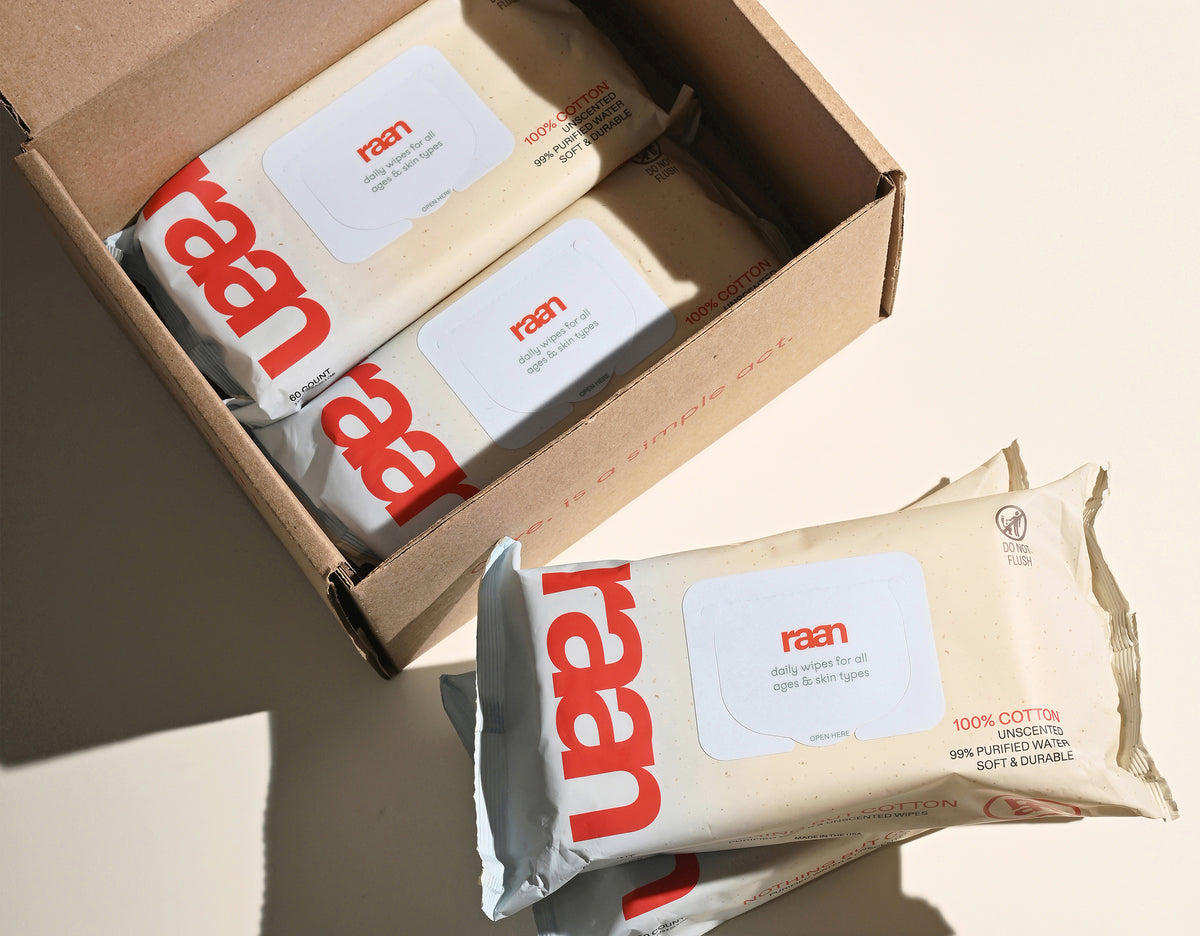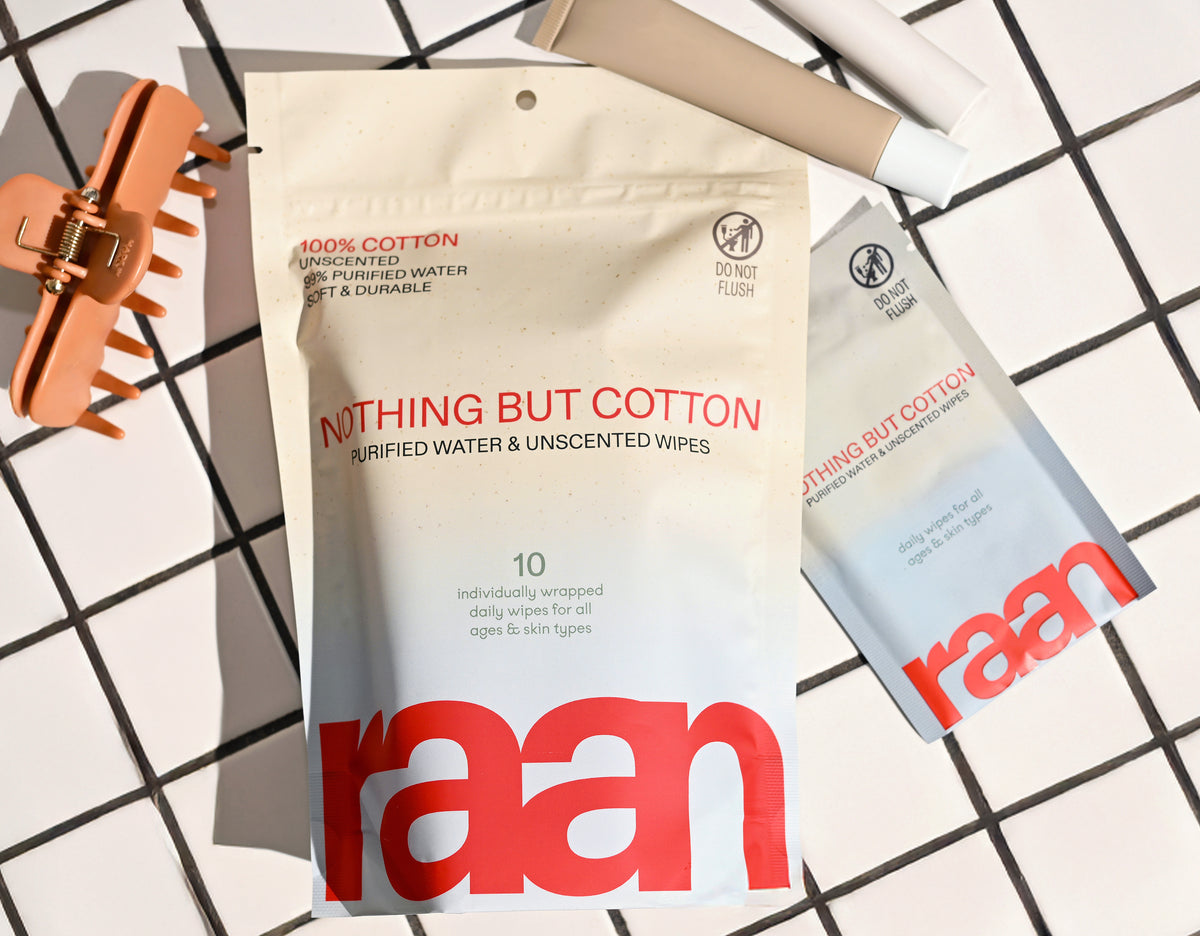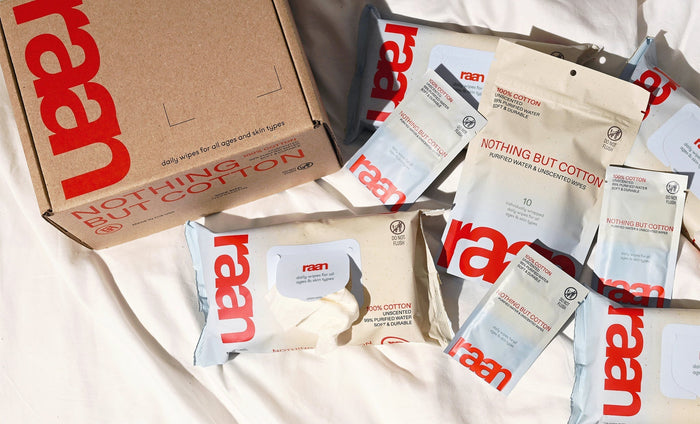Key Takeaways
- Choosing the best baby wipes for sensitive skin can be confusing due to complex ingredient lists.
- Many conventional baby wipes contain plastic fibers, synthetic fragrances, and harsh preservatives.
- These common additives can irritate even resilient skin, especially a newborn's delicate skin barrier.
- It is important to select wipes that provide gentle and honest care for sensitive skin.
Table of Contents
- Why Sensitive Skin Needs Special Care, The Science & Stakes
- Ingredient Deep Dive, What Makes a Baby Wipe Truly Gentle?
- How to Choose, A Step-by-Step Guide to Finding the Best Baby Wipes for Sensitive Skin
- Sensitive Skin Wipes vs. Regular Wipes, Table Stakes and Real Differences
- The Raan Difference, Clean, Transparent Wipes for Sensitive Skin
- Top Baby Wipes for Sensitive Skin, Honest Picks & Comparison [2025]
- Real-World Tips for Using Sensitive Skin Baby Wipes Safely & Efficiently
- Troubleshooting Common Baby Wipe Issues
The Best Baby Wipes for Sensitive Skin: Your Guide to Gentle, Honest Care
Finding the best baby wipes for sensitive skin shouldn't feel like decoding a chemistry textbook. Yet here we are, squinting at ingredient lists packed with unpronounceable additives while our babies' delicate skin reacts to everything. The truth? Most conventional wipes contain plastic fibers, synthetic fragrances, and harsh preservatives that can irritate even the most resilient skin, let alone your newborn's paper-thin barrier. The Only Unbleached, 100% Cotton Baby Wipe for Sensitive Skin offers a gentle alternative for parents seeking a truly safe option.
Sensitive skin affects up to 60% of babies in their first year, making the choice of gentle, transparent products more critical than ever. This guide cuts through the marketing noise to reveal what actually makes a wipe safe, effective, and worthy of your family's daily routine. For families on the go, Unbleached, 100% Cotton Pocket Wipe for Sensitive Skin provides convenient, travel-friendly protection.
For a deeper dive into the topic, you might also find this resource on best wipes for sensitive skin helpful as you navigate your options.
Why Sensitive Skin Needs Special Care, The Science & Stakes
Baby skin is fundamentally different from adult skin, and not just because it's impossibly soft. Newborn skin is 30% thinner than mature skin, with a developing barrier that won't fully form until around 12 months. This means everything you put on your baby's skin gets absorbed faster and deeper, making ingredient choices genuinely consequential.
Sensitive skin in babies shows up as redness, dryness, or irritation after contact with common triggers. The most frequent culprits in conventional wipes include synthetic fragrances (found in 70% of standard wipes), plastic-based materials that create friction, and preservatives like parabens that can disrupt the skin's natural pH balance.
What sensitive skin looks like: Persistent redness after wiping, dry patches around the diaper area, or fussiness during diaper changes. These reactions often appear within hours of using a new product.
The stakes extend beyond temporary discomfort. Early and repeated exposure to harsh ingredients can sensitize skin for life, potentially leading to chronic conditions like eczema or contact dermatitis. Research from the American Academy of Dermatology shows that babies who use gentler products in their first year have significantly lower rates of skin sensitivity later in childhood.
Ingredient Deep Dive, What Makes a Baby Wipe Truly Gentle?

The best baby wipes for sensitive skin follow a simple rule: less is more. A truly gentle formula should contain no more than six ingredients, each serving a clear, necessary purpose. Water should dominate the ingredient list, ideally making up 99% of the formula, with everything else carefully chosen for safety and function.
| Ingredient | Purpose | Safety for Sensitive Skin |
|---|---|---|
| Purified Water | Primary cleaning agent | Ideal, gentle and effective |
| Organic Aloe | Moisturizing and soothing | Excellent for irritated skin |
| Food-grade preservatives (Sodium Benzoate, Potassium Sorbate) | Prevent bacterial growth | Safe, same preservatives used in baby food |
| Citric Acid | pH balance | Maintains skin's natural acidity |
| Ethylhexylglycerin | Skin conditioning | Gentle alternative to harsh emulsifiers |
Ingredients to avoid entirely include synthetic fragrances (often listed as "parfum"), plastic fibers like polyester or polypropylene, alcohol-based preservatives, and bleaching agents. These additives serve cosmetic purposes but offer no cleaning benefit while significantly increasing irritation risk.
Reading labels becomes simpler when you know what to skip. If the ingredient list runs longer than your grocery list, or if you can't pronounce half the components, that's a red flag. The most effective gentle wipes prove that sophisticated formulation doesn't require complexity, just careful selection of proven, skin-safe ingredients. For more insights, check out this article on best wipes for delicate skin care.
How to Choose, A Step-by-Step Guide to Finding the Best Baby Wipes for Sensitive Skin
Choosing safe wipes doesn't require a chemistry degree, but it does demand knowing what questions to ask. Start with certifications: look for EWG Verified products, which undergo rigorous third-party testing for ingredient safety. Unlike vague claims like "dermatologist tested" (which can mean anything), EWG verification requires meeting strict standards for every single ingredient.
Your shopping checklist:
- Ingredient list under 10 items, with water as #1
- Third-party safety certification (EWG, USDA, or similar)
- Material composition clearly stated (100% cotton is ideal)
- No synthetic fragrances, parabens, or plastic fibers listed
- pH-balanced formula (should be stated on packaging)
Before committing to a full pack, test new wipes on a small patch of your baby's skin, typically the inside of the wrist or behind the ear. Wait 24 hours and watch for any redness, bumps, or irritation. This simple step can save you from discovering a sensitivity during a messy diaper change.
What if my baby reacts to "hypoallergenic" wipes? "Hypoallergenic" isn't regulated by the FDA, so it can mean virtually nothing. Focus on actual ingredient lists and certifications rather than marketing claims.
Sensitive Skin Wipes vs. Regular Wipes, Table Stakes and Real Differences
The gap between sensitive skin wipes and regular wipes goes far beyond marketing positioning. Sensitive formulations typically contain 50-70% fewer ingredients, use natural fiber materials instead of synthetic blends, and undergo additional safety testing that regular wipes skip entirely.
Material composition creates the most noticeable difference during use. Regular wipes often use polyester-cotton blends or fully synthetic materials that can feel rough against delicate skin. Sensitive skin wipes made from 100% unbleached cotton provide superior softness while avoiding the plastic fibers and unnecessary additives found in conventional options. For parents who want a convenient, irritation-free solution for every situation, a mess-ready pack is a smart addition to your routine.
The Raan Difference, Clean, Transparent Wipes for Sensitive Skin

Raan wipes represent a fundamental shift in how baby wipes are made and marketed. Built on unbleached, 100% cotton with a formula that's 99% purified water, these wipes eliminate the guesswork that plagues most baby care products. Every ingredient serves a clear purpose: organic aloe moisturizes naturally, food-grade preservatives (sodium benzoate and potassium sorbate) ensure safety without harsh chemicals, ethylhexylglycerin conditions skin gently, and citric acid maintains the perfect pH balance.
The unbleached, 100% cotton construction feels substantial yet gentle against delicate skin, while the minimal formula, free from synthetic fragrances, bleach, and plastic fibers, delivers effective cleaning without compromise. If you're just starting out, consider the starter set for a complete introduction to gentle, honest care.
This thoughtful approach to materials and formulation sets a new standard for what parents should expect from their wipes. When you choose products built on transparency rather than marketing claims, you're not just protecting your baby's skin, you're supporting a shift toward honest, functional care that actually works.
Top Baby Wipes for Sensitive Skin, Honest Picks & Comparison [2025]
After evaluating ingredient lists, certifications, and real-world performance, these are the standout options for sensitive skin care. Each serves different needs, but they all prioritize gentleness over gimmicks.
| Brand | Key Materials | Water Content | Certifications | Notable Features | Best For |
|---|---|---|---|---|---|
| Raan | 100% unbleached cotton | 99% purified water | EWG Verified, Cruelty-Free, Women Owned | Plastic-free, food-grade preservatives, 70% less packaging plastic | Complete transparency seekers |
| WaterWipes | Non-woven fabric | 99.9% water | None specified | Minimal ingredient list | Ultra-minimalist approach |
| Coterie | Plant-based fibers | High water content | Biodegradable, Compostable | Premium thickness, soft texture | Luxury feel with eco-focus |
| Honest Company | Plant-based materials | Water-based | Hypoallergenic tested | Widely available, affordable | Budget-conscious families |
Raan, The Transparent Leader
Best for: Parents who demand complete ingredient transparency and material honesty
Raan stands apart through radical transparency and material integrity. The unbleached, 100% cotton construction eliminates plastic fibers entirely, while the six-ingredient formula uses only EWG-verified components. Food-grade preservatives (sodium benzoate and potassium sorbate) provide safety without synthetic additives, and organic aloe offers gentle moisture without unnecessary extras.
The environmental commitment runs deep, 70% less plastic in packaging, 35% post-consumer waste content, and fully recyclable boxes. This isn't greenwashing; it's measurable impact backed by specific data.
WaterWipes, The Minimalist
Best for: Families prioritizing the absolute shortest ingredient list
WaterWipes delivers on its promise of simplicity with 99.9% water and a drop of fruit extract. This ultra-minimal approach works well for parents who want to avoid any potential irritants, though the lack of third-party certifications means you're trusting the brand's internal testing standards.
Strengths:
- Extremely simple formula
- Widely available in stores
- Established track record
Considerations:
- No independent certifications
- Standard plastic packaging
- Non-woven synthetic material
Coterie, Premium Comfort
Best for: Parents seeking luxury feel with environmental consciousness
Coterie focuses on premium texture and eco-friendly disposal. The plant-based materials feel substantial and soft, while biodegradable certification addresses end-of-life concerns. The higher price reflects quality materials and sustainable manufacturing processes.
Honest Company, The Accessible Option
Best for: Budget-conscious families needing reliable, gentle care
Honest Company offers hypoallergenic testing and plant-based materials at mainstream prices. While not as transparent about specific ingredients or certifications as premium options, it provides a step up from conventional drugstore wipes without the premium price tag. For more information on newborn care, see this article on soft wipes for newborn skincare.
Real-World Tips for Using Sensitive Skin Baby Wipes Safely & Efficiently
The gentlest wipe in the world won't help if you're using it wrong. These practical strategies ensure you get maximum benefit while protecting delicate skin.
Storage and freshness: Seal packs immediately after each use to prevent moisture loss. Store in cool, dry places away from direct sunlight, which can break down preservatives and dry out the solution. Rotate your stock, use opened packs within 30 days for optimal moisture and effectiveness.
Application technique matters: Pat and press rather than scrub or rub. Use gentle, overlapping motions to lift mess without dragging rough fibers across sensitive areas. For diaper changes, work from front to back, using a fresh section of the wipe for each swipe. Allow skin to air dry for 10-15 seconds before applying fresh diaper or clothing.
Patch testing new products: Before using any new wipe on your baby's diaper area or face, test on a small patch of inner arm or thigh. Apply the wipe gently, then observe for 24 hours. Look for redness, raised bumps, or any change in skin texture. If skin appears normal after 24 hours, the product is likely safe for regular use. For more on patch testing and skin reactions, see this authoritative review on infant skin care.
Travel and on-the-go storage: Transfer a few wipes to a small, airtight container for day trips to maintain moisture. For longer travel, pack unopened packs rather than partially used ones. Keep wipes in your carry-on or main compartment, extreme temperatures in car trunks or checked luggage can affect the solution's effectiveness.
Troubleshooting Common Baby Wipe Issues

If you notice persistent irritation or recurring diaper rash despite using gentle wipes, it may be time to consult your pediatrician or review the latest research on contact dermatitis and baby skin health.
Frequently Asked Questions
What ingredients should I avoid in baby wipes to prevent irritation on sensitive skin?
Avoid wipes containing plastic fibers, synthetic fragrances, harsh preservatives, and bleach. These additives can disrupt the delicate skin barrier and cause irritation, especially in newborns with sensitive skin.
Why is it important to use specially formulated wipes for babies with sensitive skin?
Babies’ skin is thinner and more permeable than adult skin, making it more vulnerable to irritation. Specially formulated wipes use gentle, transparent ingredients that protect and respect this fragile barrier, reducing the risk of redness or discomfort.
How can I tell if my baby has a reaction to certain baby wipes, and what symptoms should I watch for?
Look for signs like redness, rash, dryness, or increased fussiness after wipe use. These symptoms indicate the skin may be reacting to ingredients or materials in the wipes, signaling a need to switch to a gentler option.
What makes unbleached, 100% cotton baby wipes a better choice for sensitive skin compared to conventional wipes?
Unbleached, 100% cotton wipes avoid plastic fibers and harsh chemicals, offering a softer, more breathable material that’s less likely to irritate. Their simple, minimally processed nature supports skin health by preserving natural qualities rather than masking issues with additives.






